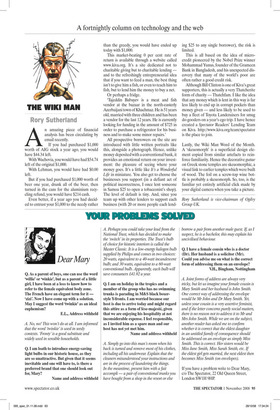A n amazing piece of financial analysis has been circulating by
email recently. If you had purchased $1,000 worth of AIG stock a year ago, you would have $44.34 left.
With Wachovia, you would have had $54.74 left of the original $1,000.
With Lehman, you would have had $0.00 left.
But if you had purchased $1,000 worth of beer one year, drunk all of the beer, then turned in the cans for the aluminium recycling refund, you would have $214 cash.
Even better, if a year ago you had decided to entrust your $1,000 to the needy rather than the greedy, you would have ended up today with $1,000.
This market-beating 0 per cent rate of return is available through a website called www.kiva.org. It’s a site dedicated not to charitable giving but to charitable lending — and to the refreshingly entrepreneurial idea that if you want to feed a man, the best thing isn’t to give him a fish, or even to teach him to fish, but to lend him the money to buy a net.
Or perhaps a fridge.
‘Tajeddin Babayev is a meat and fish vendor at the bazaar in the north-easterly Azerbaijani town of Khachmaz. He is 51 years old, married with three children and has been a vendor for the last 12 years. He is currently looking for funding in the amount of $725 in order to purchase a refrigerator for his business and to make some minor repairs.’ All prospective borrowers on the site are introduced with little written portraits like this, alongside a photograph. Hence, unlike money deposited with a conventional bank, it provides an emotional return on your investment: the pleasure of seeing where your money goes. It’s a little like It’s a Wonderful Life in miniature. You also get to choose the businesses you support (in a defiant act of political incorrectness, I once lent someone in Samoa $25 to open a tobacconist’s shop). The level of default is tiny. And, since you team up with other lenders to support each business (with 20 or more people each lend ing $25 to any single borrower), the risk is limited.
This is all based on the idea of microcredit pioneered by the Nobel Prize winner Mohammad Yunus, founder of the Grameen Bank in Bangladesh, and his unexpected discovery that many of the world’s poor are often rather a good credit risk.
Although Bill Clinton is one of Kiva’s great supporters, this is actually a very Thatcherite form of charity — Thatchfam. I like the idea that any money which is lent in this way is far less likely to end up in corrupt pockets than money given — and less likely to be used to buy a fleet of Toyota Landcruisers for smug do-gooders on a year’s ego trip. I have hence created a Spectator Readers’ Lending Team on Kiva. http://www.kiva.org/team/spectator is the place to join.
Lastly, the Wiki Man Word of the Month. A ‘skeuomorph’ is a superficial design element copied from similar artefacts to reinforce familiarity. Hence the decorative guttae on Greek stone temples are skeuomorphic, a visual link to earlier temples which were built of wood. The foil on a screw-top wine bottle is probably a skeuomorph. So, too, is the familiar yet entirely artificial click made by your digital camera when you take a picture.


































































































 Previous page
Previous page